Tandemstar: Two Suns at Sunset excerpt
We’re one week away from the release day for book one of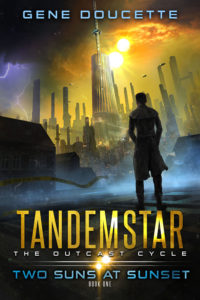
Tandemstar: The Outcast Cycle —Two Suns at Sunset
This seems like a good time for a sneak peek at the book! Enjoy!
Two Suns at Sunset
Chapter One
The clanging on the radiator pipe woke up Makk about ten minutes before his seventeen o’clock alarm was set to go off.
He didn’t know what he was hearing at first, nor was it initially clear where he was or what time it was. He’d worked an overnight shift, so bedtime was ten o’clock…or, it should have been. One didn’t just go directly from a shift to bed without a drink first. There had to be a little separation between the job and the leisure, and a shot of Dorabonian rye was the quickest way to create that separation.
Also, one didn’t have just one drink. One had two, or three, or six, especially when one was an idiot.
Thenone went to bed.
CLANG CLANG CLANG
The pipe rang in time with the throbbing behind his eyes, and so he wondered if the problem was that something metallic had come loose inside of his skull. Failing that—and now he was waking up enough to consider things a tiny bit more rationally—it could have been that someone was doing work outside the window.
Makk’s apartment was in the Decane Quarter; rather, what it said on the maps. Only tourists (and, presumably, map-makers) called it that, and only if they were confused. It was named after the politician Andon Decane who—some two hundred years prior—had been special envoy to Kindon, among other things. That posting was nearlythe height of irony, as Andon Decane actively despised the Kindonese, and made no effort to hide this fact. What wasthe height of irony was that the quarter with Decane’s name on it was now known as Kindontown by nearly everyone.
Makk wasn’t Kindonese, but the rent was cheap, and he spoke fluent Taku, so he got along okay.
CLANG CLANG CLANG
It wasn’t work outside; it was Binchagag, whacking the basement radiator pipe with a stick.
“All right, I’m coming,” he shouted. Binchagag couldn’t hear him, but Makk felt better for having said it anyway. Then he got out of bed, picked up the nearest boot, walked over to the radiator, and hit it a couple of times. Depending on the urgency of the matter, that should buy him at least enough time to clean up and drag himself downstairs. And maybe even get in a shower.
The apartment was indeed cheap, in part because of its location, and in part because it was really small. Makk’s bed was his couch, and his bedroom was his living room, and his living room was his kitchen. Thankfully, none of them was also his bathroom, as it was separate.
The walls were thin, the windows let in all kinds of draft, and the radiator his landlord was so very fond of using as a means of communication only occasionally produced heat. But nobody came to Kindontown unless they were Kindonese, or they were lost, which made it was a good place to live if wanting to be largely left alone. Generally speaking, Makk always wanted to be left alone.
CLANG CLANG CLANG
“It’s an emergency, then,” he muttered. Someone must have been having quite a run of luck in the basement.
He dropped the boot and headed for the bathroom, spotting the empty bottle of rye on the kitchen counter as he went.
“Okay, maybe I had seven or eight drinks,” he said. Oddly, this made him feel better about the mass suicide of brain cells that was making it hard to see straight. At least how he felt now had been earned.
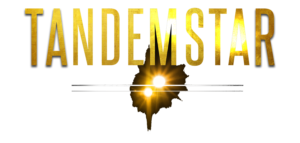
He skipped the shower, and the shave. There was a real chance that Binchagag was about to take up the rest of Makk’s free time, so a few minutes to make himself presentable was probably warranted, except his shift began at 18:30. Nobody cared how you looked on the overnight shift.
Velon was quite literally the city that didn’t sleep. Most of the businesses operated in some form—even if that form was skeletal—all twenty hours of the day, all seven days of the week, all 529 days of the year. Makk assumed this was true for the entirety of Inimata, and possibly true in other countries as well. (It was definitely the case when he was in the military, but the military was run by crazy people who were probably looking for an hour twenty-one and twenty-two to take advantage of.) At some point, everyone just agreed that lowered standards in personal grooming was their reward for what they called working the over.
In short, Makk didn’t need to shave, and even though the shower would have been nice, it was also unnecessary, so he skipped it too. He did find a clean shirt, and a mostly-clean pair of pants. Then he threw on his jacket, grabbed what he needed for work, and headed out.
Hopefully, somebody downstairs had coffee brewing.
The staircase leading to the apartment was external, and perilously steep, which was a common characteristic in this part of the city. The buildings in Kindontown looked to have been assembled haphazardly by a child god with a poor understanding of the basics of structural integrity. They leaned, and loomed, and most appeared top-heavy. (A lot of them were, thanks to probably-illegal apartments built out of plywood on top of roofs. Makk lived in one of them.) From the street level, it felt like the buildings were staring down from directly overhead, as if ripped from the nightmares of a worried agrarian on an unpleasant business trip.
In Makk’s version of this nightmare, the buildings were gaming tiles, stacked on their narrows and awaiting that child god to come along and tap the building at the end, sending them crashing down one by one.
He took a minute on the landing outside of his front door, in order to take in the city. Even at night—and the Dancers had set at least a couple of hours earlier—and even in this backchannel part of town, Velon was entirely too busy to cope with, absent a pause to recalibrate. Makk had spent the early part of his life in a uniform, running drop ships and guarding borders, but none of that elevated his pulse rate as much as just walking out his own front door on a busy evening in downtown Velon.
A merchant bazaar was going on across the street, spilling people off the curb and into traffic, which could have been a problem if any of the ground traffic was moving, which it wasn’t. Above the ground traffic, every couple of minutes, an aero-car drove by, blasting hot, steamy air from its rear exhaust fans and raising the ambient temperature of all the atmosphere on the block by a couple of degrees. Or so it seemed.
Every crevice of city not taken up by a person or a car was occupied by an advertisement for something, or a streetlight. It was, thankfully, a cloudy night—it had been raining off and on for the past two days—or the sky itself would have been taken up by an advertisement as well, as Lys was scheduled to appear overhead in another hour.
Makk loved everything about the city, when he was on the ground. Up a level, and looking down with the same trepidation as a kid who’s about to learn how to swim in a rapidly-flowing river, he couldn’t believe anyone allowed themselves to live like this.
He closed his eyes, waited for a little dizziness from what was probably incipient vertigo to pass, and then headed down to the basement, to see what Binchagag wanted.
The ground floor was taken up by a restaurant called Lucky Twins, which specialized in mediocre but exotic variations of Kindonese food. When Makk felt especially adventurous—or if he was just too tired to walk any farther—he’d get food from the place, if only to entertain himself with a game of guess what part of what animal this thing came from?This was sometimes pretty easy, because certain body parts came out of the other side of food preparation looking a lot like they did when going into it, and then it became a game of I dare you to eat this.
He stopped at a bar halfway between the front door and the back staircase and caught the eye of Lina, the probably-underage girl currently tending bar.
“Coffee?” he asked, in Taku.
“You look like you died six hours ago,” she said. “Coffee’s old.”
“Is it hot and more or less black?”
“More or less.”
She poured a cup, then pushed a bowl of salted chicken skin rinds in front of him, and provided a shot of grain wine as accompaniment.
“Hangover cure,” she said. “Finish it all, vomit. All better.”
“No time to vomit,” he said, downing half of the coffee. It was too hot and too old, scalding the back of his throat and traumatizing his taste buds. He moved on to the chicken rinds, which tasted great by comparison.
“There’s a bottle of pinks under the cash box,” he said.“Give me three of those.”
“My way works better,” she said. “And those are not for customers.”
“I’m not a customer.”
“No, you’re a pain in my ass, Cholem,” she said. Lina punctuated the name she used for Makk by tapping her chest with two extended fingers. It was meant to ward off evil, but in this case, she was doing it to guard herself against general misfortune. It came from one of Kindon’s backwater belief systems, but Makk didn’t know which one. Lina probably didn’t either.
She pulled the bottle out and extracted three pills for him. Then the pipe behind the bar made the clanging noise.
“Sounds urgent,” Lina said. “Better hurry.”
Makk took the pills, downed the grain wine, and got to his feet. His stomach commented on his meal choices, but didn’t threaten to protest any more stridently, so he figured he was good enough to at least make it downstairs.
Past the bar and at the back of the restaurant, there was a down-staircase with an “employees only” barrier in front of it. Makk pushed the barrier aside, and headed down. Nobody bothered to stop him, which may have been because they all knew him, but he was pretty sure anybody walking to the back and heading down those stairs would have been able to do so unimpeded; knowing it was okay to use the stairs was permission enough to use them.
There was a big guy at the bottom of the staircase, in front of a steel door with a square peekaboo window.
“Evening, Tohai,” Makk greeted, in the common tongue—Endish—rather than in Taku.
“Makk,” he said. Tohai was not an erudite man in either tongue.
“Bincha hit me up,” Makk said. “Someone having a run?”
“I think trouble.”
“What kind?”
Tohai shrugged, and pushed open the door.
The basement of the Lucky Twins was a different kind of overwhelming. For starters, there was the smoke from the bacco sticks, which was thick enough to obscure the back half of the room. Makk was never a smoker, but he’d spent enough time around smokers that it hardly mattered. (And he did take a pipe or a stick from time to time, just not habitually.) Everyone in the basement smoked, non-stop, and the ventilation was crap. There were ceiling fans, and half-windows near the top of the outside walls that tilted open, but the air pressure between the inside and the outside was usually equilibrated, so the smoke didn’t do much but circle around the room in whorls and waves.
There were fifteen tables in the center of the floor, and a bar along the right side, directly under the restaurant bar and the radiator in Makk’s apartment. It was early, so the tables weren’t filled, and only a couple of people were standing at the bar. One of those people was Binchagag. Another was a tall, blonde woman who didn’t belong there. She and Bincha appeared to be in an argument. Given all of Bincha’s gesticulation, it looked like he was losing that argument.
Binchagag pulled Makk into the situation before Makk had even made it all the way to the bar.
“Ah! There, you…you explain it to her,” Binchagag said to Makk. “She is accusing us of crimes.”
“What kinda crimes?” Makk asked. “I’ve got my own list, maybe we can compare.”
“This is not joking,” Bincha said. He was flustered, and when he was flustered, his command of the common tongue tended to break down.
Binchagag switched to Taku.
“Your kind, your problem,” he said.
Makk took a closer look at the woman, to work out exactly what Bincha meant by that. She was tall, and well-dressed in a blue pants suit with a white blouse. Her blonde hair was pulled back in a neat braid, revealing a perfectly round face with high cheekbones and blue eyes. Makk, in contrast, was wearing yesterday’s clothes (except for the shirt), his hair was standing in three directions, and he needed a shave. He was also shorter and rounder than she was.
They didn’t look like they were the same kind of anything. They didn’t even look like the same species.
“Hello,” the woman said, with a half-smile. She was looking him over, at the same time he was looking her over. Presumably, she was unimpressed.
“Hi,” he said, stepping up to the bar. “What can I do for you?”
“Well, that little fellow thinks you can convince me that what I’m looking at right now is something other than an illegal gambling parlor,” she said. “Do you think you’re up to that?”
Makk shrugged.
“I can give it a shot, sure, but only if you call Bincha here a little fellowone more time, because that’s damned funny.”
Binchagag—who was only short compared to the average Inimatan, but about right for someone from Kindon—swore in Taku and stormed off. She watched him go, and then watched Makk slide onto a bar stool.
“I’m waiting,” the woman said.
She was more attractive up close, which was almost never the case with anybody.
“Do you want a drink?” he asked, gesturing to the bar seat beside his, and waving to the tender. The three pinks and belly full of coffee were kicking in; there was a chance he could muster up a small modicum of charm, provided his breath wasn’t too bad.
“I’ll have a water,” she said, accepting the seat. “Is the water here clean?”
“I’d stick with the spirits if I were you. What’s your demon?”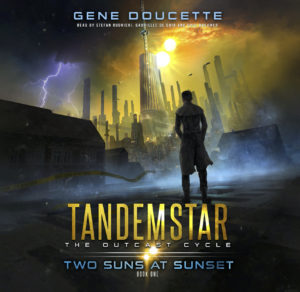
“They won’t carry it,” she said, “but I’ll take whatever’s amber and comes out of that nozzle over there.”
“Deterrent Ridge Draft?” the bartender said. Her name was Phaiet, and Makk knew her entire life’s story, including how she ended up with a synthetic leg, tending bar in an illegal gambling establishment in a basement in Kindontown.
It was possible Makk spent too much time beneath the Lucky Twins.
“Make it two,” Makk said. He was on shift shortly, but again, people didn’t care so much when you were working the over, and besides, beer barely counted as alcohol. His stomach reminded him about the recently-consumed chicken skin rinds and grain wine, and his hangover notified him that any more alcohol at this point would be a poor choice. He ignored both.
“So I’m guessing,” Makk said, to the blonde, “based on how much you’ve rattled my landlord, that you have some kind of authority.”
“Is that what you are to him?” she asked. “His tenant?”
“Yeah, I live upstairs.”
Strictly speaking, this was an accurate description of his relationship with Binchagag; the bulk of it was transactional in nature. However, Bincha was known to let Makk borrow one of his ground cars in a pinch, and also lent Makk the use of his hunting cabin once or twice a year.
“And he calls you down whenever there’s trouble?” she asked.
“Kinda. Are you trouble?”
She reached into her jacket pocket and pulled out a badge. This was a thin piece of metal and synthetic glass that also worked as a camera and a voicer. It was glowing green and yellow, which meant that she was on duty.
“Ohh, you’re a cop,” Makk said. “Maybe the water was a better idea.”
“You told me the water was suspect, and I’d barely call D.R. Draft alcoholic,” she said. “I’ll live.”
“Can I see that?”
She handed over the badge. He studied it for about twice as long as he actually needed to, and then handed it back.
“Detective Viselle Daska,” he said. “Not just a cop; a detective.”
“Yes.”
“Daska. What is that? It sounds Unakian.”
“My father’s from Dunn,” she confirmed. “And I think you’re stalling. Are you going to explain what’s going on in this room better than hedid, or do you want to go through my whole family tree first?”
“We can do both; I’ve got time.”
Phaiet served up the beer. Detective Daska took a sip, cringed gently, and took another.
“Well, I don’t have time,” she said. “I’m a few minutes away from ordering backup and arresting everyone.”
“Including me?”
“Depends. What else do you do for Mr. Binchagag?”
“It’s just Binchagag,” he said. “That’s his whole name. This is really all I do for him.”
“And what is that again? Run down to the basement to charm policemen out of busting an illegal operation?”
He smiled.
“I wasn’t even trying to be charming yet,” he said. Although he was.
Generally speaking, Makk didn’t like other people. But, he liked women just fine. This was not to say that women were not also people, just that he was capable of overriding his instinct to avoid people under certain circumstances. He also knew his relationship with Detective Viselle Daska was shortly going to change into something that prohibited flirting and the general application of charm; he was going to have to get the most out of it while he could.
“I was exaggerating,” she said.
“This isn’t usually what I do for Bincha, no. I’m more like a professional bad luck charm.”
He rolled up his right sleeve and held out the back of his wrist so she could see the mark. It was a small black symbol that looked like a 3 and a 4 having intercourse.
For the first time since they began talking, Viselle Daska looked surprised.
“You’re a Cholem,” she said.
“That’s me; professionally unlucky.”
“Put that away,” hissed Phaiet, from across half the bar, “before you clear out the place.”
Makk pulled his sleeve back down to cover up the mark.
“I don’t think I’ve ever seen one of those,” Daska admitted.
“The brand? It’s more common than you probably think; most times it’s just not flashed like that. Still, better than drowning, huh?”
He’d met at least two dozen people with the same mark; most of them only showed him after they’d seen his, and otherwise kept it hidden.
“Oh, I understand now,” Detective Daska said. “When your friend Mr. Binchagag is dealing with a hot table, you sit down and show off your little tattoo.”
“It’s just Binchagag, but yeah. It empties the table, and sometimes the whole place. Not that there’s any gambling going on in this establishment.”
“Of course not. What’s your name, anyway?”
“Makk.”
“Do you also not have a last name?”
“Oh, I do.”
“Is this your full-time job, Makk? Local Cholem?”
She said the last word loud enough to cause a couple of the people in the room to turn around in a mild panic. One of them started closing out his bet.
Even the word was bad luck. There was a whole set of rituals observed by the more superstitious, when the word was said aloud, regardless of whether or not an actual Cholemwas nearby. Makk had seen people spin around, spit on their hands, and so on. It was the kind of silliness he’d find amusing if he wasn’t one.
Detective Daska noticed the same thing he had.
“Maybe I don’t need to call in any backup,” she said. “I can just say that word loudly.”
“I think after you’ve said it three times you should avoid traffic the rest of the day,” he said. “But no, it’s not my full-time job. It’s just what I do if I happen to be around and Bincha needs a bailout. In exchange, he gives me a discount on the rent; it’s nice. Maybe the only benefit I’ll ever get out of being a Cholem, but I’ll take it.”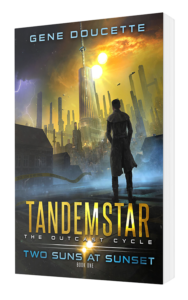
Makk was drastically underselling what it was like to go through life with the Cholem brand on his wrist.
It had been put there when he was barely two. Back then, it was an inky black splotch that looked more like a birthmark than a deliberate tattoo. But it grew with him, as the people who put it there knew it would, until it formed the appropriate symbol.
Makk was born on the thirty-fourth day of the month of Sevvitch, in the winter (or ‘Do-’) season. This was neither his choice nor his fault. Neither—one must assume—was it the fault of his mother and father, or the doctors who delivered him, or the nurses who aided the doctors. It was just a thing that happened, on a day that should have been treated like every other day on the calendar.
The problem was that the month of Sevvitch was only supposed to have thirty-three days. This was the case for all sixteen of the months on the calendar, except for one: the springtime (or ‘Ta-‘) month of Zenita. But Ta-Zenita was a special day, the last day of the year, and a holiday.
It would have been nice if everyone treated the thirty-fourth day of Do-Sevvitch the same way, but they didn’t. Do-Sevvitch’s 34thday was a leap day that took place only once every four years—all except for one year out of every thirty-three, and then it was skipped—and was considered unlucky by essentially everyone on the planet.
Children born on the Do-Sevvitch leap day were called Cholem, which was a derogatory appellation from a pre-Endish tongue. In less civilized times, and places, Cholem were routinely drowned, so as to avoid the presumptive string of bad fortune that might befall an entire village. The slightly more civilized expression of this irrationality came in the form of the mark on Makk’s wrist.
It was better than drowning, yes, but that wasn’t saying much. He still saw the periodic gestures of self-blessing—if not open recoil—in response to his presence, as if bad luck was viral.
The best reaction of all would be if everyone grew up and stopped believing in these things, but that was probably too much to ask for.
“To being professionally unlucky,” Daska said, toasting him with her beer stein. She didn’t seem at all put off by his mark, outside of a sort of scientific curiosity. “Since I’m about to arrest everyone, it seems especially apt.”
“Oh, right,” he said. “That. So, this isn’t gambling. What you’re witnessing is a religious ceremony.”
“Ooh, that’s almost interesting. Go on.”
“That’s all I have so far.”
She laughed.
“Now I’m disappointed. Look, Makk, I can’t be the first cop to walk down those stairs.”
“You are definitely not the first cop to walk down those stairs,” he agreed.
“Well what did you tell them? Religious ceremonyand then have a nice day? At least pretend not to insult my intelligence.”
“I didn’t have to tell them anything.”
“Bribes, then?”
“No bribes. They just didn’t mind it all that much.”
“Give me something better,” she said.
Viselle Daska appeared to be genuinely enjoying herself, which could have meant his charm was working, but there were too many other factors in play to be sure what was actually going on. She had to know who he was by now.
“How about this,” he said. “It’s just polite wagering among friends.”
“Not nearly as good,” she said.
“But it’s true. I think most of these folks know each other pretty well.”
As if gifted upon her by the gods, a loud argument broke out between two gamblers at a table in the middle of the room. Tohai had to scurry over from the door to break up what was about to become a fistfight.
“I think we can throw away the wordpolite,” she said. “And I speak enough Taku to know that those weren’t the kinds of words friends usually use with one another.”
“Friends fight sometimes! No different from, say…well, we’re not friends, you and I. We just met. But a friendly wager between us would still be different from gambling. For instance, let’s say you and I bet you’re not going to arrest anyone here tonight.”
“What are we wagering?”
“The beer. If you arrest someone tonight, in this establishment—which again, is not a gambling establishment—I’ll buy you that beer. If not, you’ll buy me this beer. How does that sound?”
“Pretty weak odds on your part. All I have to do to win is arrest someone. I could even leave all of these people alone and just arrest you.”
“On what charges?”
“I don’t think valid charges are a requirement of the wager,” she said.
“You’d have to take me all the way to Twenty-One Central and book me, or else I’m not officially arrested, and you’ll lose the bet. I don’t know much about you, but you don’t look like someone ready to run up a man on bogus charges just to win a beer.”
She laughed.
“All right, if this isn’t a gambling establishment, as you keep saying, then what is it?”
“A social club.”
“A social club. Where people of similar interests…”
“…said interests which happen to include wagering,” he said.
“Of course. Where people of similar interests gather for a nice, polite game of five-square.”
“Or thirty-three deck. Or tiles. That game over in the corner is called Whin-Whon. I don’t understand it at all, but the Kindonese seem to like it.”
“But this is just a social event.”
“That’s what I’m saying.”
“In that case,” she said, “there’s no vigorish. Obviously. And I’m sure they’re onlywagering against one another, and not the dealer. Right? For this to be a set of friendly wagers taking place in a social club.”
“Well? I mean, Bincha’s gotta keep the lights on. It’s a perfectly reasonable expectation.”
She shook her head.
“Yes, see, you nearly had it,” she said. “Mr. Makk, you are about to lose your bet with me.”
“No, hang on, you haven’t seen all my tiles yet.”
She raised a single eyebrow, which he found weirdly attractive under the circumstances.
“All right,” she said, “poorly-chosen analogy aside, go on.”
He got off the stool and stretched, as if the next thing he had to say would require some physical activity. He really just needed to straighten his legs for a bit. He had a bad knee, a leftover from his military service. The knee didn’t care for barstools.
“Here goes,” he said. “You’re not going to arrest anybody because you’re not a vice cop. You’re a detective first grade, and this is only your…second day?”
“It’s my sixth,” she said. “And now you’re getting obnoxious. How’d you know my grade?”
“I know my way around a badge,” he said. “Yours isn’t the first one I’ve seen. Homicide, right?”
Detective Daska looked ready to pull her badge back out to see if there was perhaps some information on there that she missed the first hundred times she looked at it.
“Yes…” she said, reluctantly.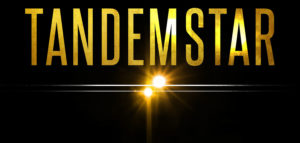
“You’re the transfer from cyber, huh?”
“How do you know all this?”
“Here, I’ll show you,” he said. Then he pulled out his own badge. It was glowing blue and white, because unlike Daska, he wasn’t currently on duty.
“Detective Makk Stidgeon,” she read. “Third class.”
She handed it back.
“Also homicide,” she added.
“Yep. So like I said, you’re not going to arrest anyone tonight, because there aren’t any dead bodies in here, and if you were working a case where there was a body somewhere else, I’d already know about it. You can make a vicearrest if you want, but I’m going to have to ask really nicely that you don’t, and hope I don’t have to add that I also outrank you.”
“Right.”
“And now you owe me a beer.”
She laughed.
“Lot of work for a free beer,” she said. She slipped a card from her back pocket and swiped it over the bar sensor. “And sorry, but you don’t look like a detective.”
“Honest mistake.”
She made the crinkly face he’d already seen a few times tonight, denoting confusion.
“What time are you on duty?” she asked.
“I don’t have to clock in until eighteen-thirty,” he said. “Why?”
“Because I think Central has a different schedule.”
She pointed to the badge in his hand, which was now red-yellow.
“Aw, come on,” he said.
The screen on the badge went from displaying Makk’s bona fides to a map image, with a flashing red dot on one part of the map. Then the whole thing began to vibrate.
“Stay right there,” he said to Daska, stepping near the door where the sound of the gambling floor was a little less obvious.
He connected the direct, and held the badge up to his ear.
“Hey, captain,” he said. “I’m off-duty.”
“Not anymore,” Captain Llotho said. “You just caught a body.”
“That doesn’t mean I’m on duty. That means someone who ison duty caught a body. That’s how work shifts are supposed to go.”
“Cut me a break, Makk,” Llotho said. “This looks high-profile, and next up is a rook.”
Makk looked at Viselle Daska, still at the bar, silently asked him what was going on.
“Anyone I know?” he asked.
“If you met her, you’d know it. I’ll have her second-seat on this one, say it’s department policy or…the body’s in the House, Makk. This is some shit. I need someone I trust in front of it.”
“You’re kidding.”
“Not even a tiny bit. Scene officer says it’s one of the townhouses. Veesers are already on the grounds; we’re putting up a cordon now. It can’t wait until eighteen-thirty, you get me?”
“Yeah, all right.”
“Thanks, I owe you one.”
“You owe me at least five by now,” Makk said. “I’m counting. Have the rook meet me at the scene.”
Makk disconnected, and walked back to the bar.
“What is it?” Daska asked.
“Dead body in Andel Quarter,” he said. “Expect a direct from Llotho.”
He finished off his beer, slid the stein across the bar, and headed for the door.
“Hang on,” Daska said. “What did he say, exactly?”
“Ask him yourself, detective,” Makk said. “I’ll catch up with you at the scene.”
Whatever response she had in mind was cut off by Llotho’s direct on her badge. Makk hit the exit, and headed up to the street.

![]()
Available in all formats on September 8, 2020
Join my mailing list, to receive my newsletter Writing from the border of Sorrow Falls. You can sign up from here.
